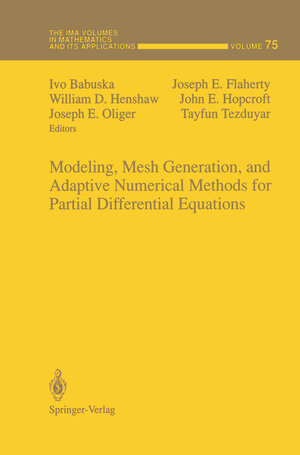
×
![Buchcover ISBN 9780387945422]()
Modeling, Mesh Generation, and Adaptive Numerical Methods for Partial Differential Equations
herausgegeben von Ivo Babuska und weiterenInhaltsverzeichnis
- Week 1.
- NURBS and grid generation.
- Coping with degeneracies in Delaunay triangulation.
- Geometric approaches to mesh generation.
- Refining quadrilateral and brick element meshes.
- Automatic meshing of curved three—dimensional domains: Curving finite elements and curvature-based mesh control.
- Week 2.
- Optimization of tetrahedral meshes.
- A class of error estimators based on interpolating the finite element solutions for reaction-diffusion equations.
- Accuracy-based time step criteria for solving parabolic equations.
- Week 3.
- Adaptive domain decomposition methods for advection-diffusion problems.
- LP-posteriori error analysis of mixed methods for linear and quasilinear elliptic problems.
- A characteristic-Galerkin method for the Navier-Stokes equations in thin domains with free boundaries.
- Parallel partitioning strategies for the adaptive solution of conservation laws.
- Adaptive multi-grid method for a periodic heterogeneous medium in 1 ? D.
- A knowledge-based approach to the adaptive finite element analysis.
- An asymptotically exact, pointwise, a posteriori error estimator for the finite element method with super convergence properties.
- A mesh-adaptive collocation technique for the simulation of advection-dominated single- and multiphase transport phenomena in porous media.
- Three-step H-P adaptive strategy for the incompressible Navier-Stokes equations.
- Applications of automatic mesh generation and adaptive methods in computational medicine.
- Solution of elastic-plastic stress analysis problems by the p-version of the finite element method.
- Adaptive finite volume methods for time-dependent P. D. E. S.
- Superconvergence of the derivative patch recovery technique and a posteriori error estimation.




